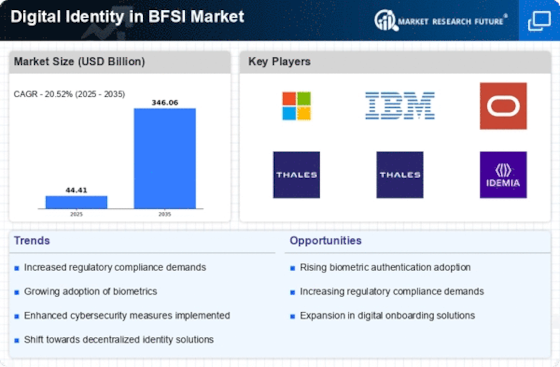Market Analysis
In-depth Analysis of Digital Identity in BFSI Market Industry Landscape
The realm of digital identity within the BFSI industry is multi-layered and dynamic, with the factoring-variables' interaction. The proliferation of digital platforms, the rising consumer demand for seamless and secure experience, and the regulatory pressure are the key factors that define the trend of digital identity in BFSI as well as other sectors.
Above all, the digital revolution in functionality of BFSI sector is underway by request for comfortable and productive services. There is a growth in the percentage of consumers that conduct their banking, investments, and insurance through digital channels these days, that have therefore caused digital identity to be very solid. The transformation of this and the other forces that are out there coinciding with mobile phones creation, the Internet access and most importantly – the desire to control personal finance remotely.
Since the second important aspect is advanced security and fraud prevention, the provision of these is a market factor. With E-commerce being on the rise and digital transactions moving online, the necessity for cyber security has gone up due to the ever-increasing instances of identity theft, data breach, and other cyber attacks. Therefore, BFSI institutions are thus forced to buoy for latest digital technologies to validate the users, safeguard information and as well thwart the cyber threats.
Additionally, the regulatory enforcements and the benchmarks set of the industry constitutes a vital aspect of the digital identity infrastructure of BFSI. The strict regulations such as GDPR, PSD2 and client involvement that demand for the development of proactive identity verification practices are examples. This impel the BFSI organizations towards innovative technologies including but not limited biometrics, blockchain, and machine learning is to facilitate the process and yet give the user an enjoyable experience.
Apart from this, the customer expectation and the choices are also playing a role which is changing the top players in the digital identity market. Temp rate customers expect the best quality of services which are obtains with the minimum effort of their side. Banks respond to this demand with the help of digital identity integration for instance account opening, credit scoring, and selective financial consulting. The very customer-oriented concept now is in a position of making the competitive arena different and accelerating digital identity technologies usage.
Secondly, the emergence of the Open Banking ecosystem in BFSI is redefining the role of digital identity as well. Consequently, data exchange can only work through securable and interconnected digital identification systems. Financial institutions are tasked with the job of securing data exchange so that they cannot be forged nor stolen, at the same time, with consumer safety and privacy as their number one objective, thus necessitating the need for standardized digital identity frameworks.


















Leave a Comment